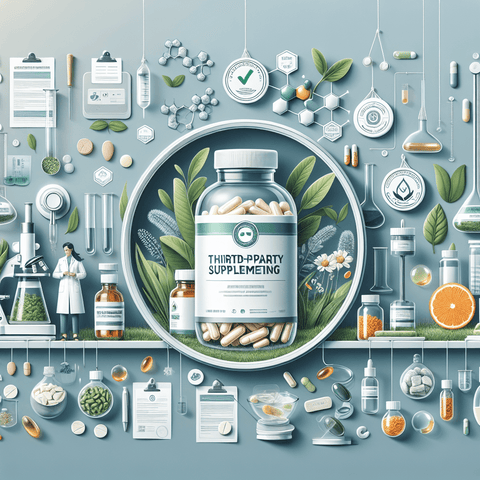The global nutritional supplement industry is experiencing explosive growth, with millions of consumers worldwide turning to vitamins, minerals, and botanicals to support their overall health and wellness. From boosting energy to supporting immune defense, the promises tied to supplements are alluring. However, as more products crowd the shelves, consumer concerns over safety, efficacy, and ingredient transparency have also surged.
In a competitive space with thousands of brands and endless formulations, it's increasingly difficult for shoppers to know which products are truly trustworthy. Labels may make powerful claims, but how can consumers be certain they are getting a product that actually delivers what's promised—nothing more, and definitely nothing harmful?
This is where third-party tested supplements come into the picture. Third-party testing refers to the rigorous process of independent evaluation performed by accredited laboratories not affiliated with the manufacturer. These third-party labs verify a product’s contents, purity, potency, and safety against established standards.
Unlike in-house testing, third-party certification offers an unbiased lens into what’s really in a supplement bottle. As health-conscious shoppers demand greater transparency, third-party testing is emerging as a gold standard for trust, quality, and consumer protection.
In this comprehensive guide, we’ll explain what third-party tested supplements truly are, how they’re tested, and why they should be non-negotiable in your supplement regimen. Whether you're buying Vitamin C for immune support, Omega-3 for heart and brain function, or Magnesium for muscle and energy support, quality and testing matter. Let’s explore why.
Understanding Third-Party Tested Supplements in Nutritional Health
Third-party tested supplements are nutritional products that have undergone voluntary, independent testing by an external laboratory. These labs are not owned or influenced by the supplement manufacturer and are typically accredited by national or international regulatory authorities to ensure impartiality and scientific rigor.
So, what does this mean for the supplement consumer?
Unlike in-house testing, where the brand is responsible for its own quality tests, third-party labs offer an objective assurance that a product meets label claims and regulatory requirements. This discrepancy is vital in today’s marketplace where health trends shift rapidly, and some manufacturers cut corners to meet demand. An independent test not only confirms that you're getting the advertised active ingredients in the correct amounts, but also weeds out the presence of potential contaminants such as heavy metals, pesticides, and harmful microbes.
The typical third-party testing process includes:
- Ingredient verification: Ensures each listed ingredient is present and meets potency levels.
- Purity tests: Screens for harmful substances like lead, arsenic, mercury, and microbial contamination.
- Label accuracy review: Confirms product labeling matches actual contents.
Several reputable organizations specialize in these evaluations, including:
- NSF International – Offers certification for sport and general supplements by testing for banned substances and contaminants.
- U.S. Pharmacopeia (USP): Verifies identity, strength, quality, and purity of active ingredients.
- Informed Choice/Informed-Sport: Targeted at athletic supplements; ensures they’re free from substances banned in professional sports.
Each of these certifications adds an extra layer of trust and transparency to the supplement you're buying. For example, a bottle of Omega-3 carrying the NSF or USP certification has passed an authentication process far more rigorous than those simply “verified in-house.”
Increasingly, consumers are seeking out these vetted products, especially when buying online. Marketplace giants and specialty providers like Topvitamine.com’s certified Vitamin K supplements now feature third-party tested options prominently to cater to this quality-conscious demographic.
Real-world examples on the Topvitamine platform include formulations from brands that highlight their NSF or Informed Choice credentials. By identifying these labels, consumers gain peace of mind knowing that what's on the label is actually what’s in the bottle—and nothing else.
Why Independent Supplement Testing Matters for Your Health and Safety
The significance of independent supplement testing becomes crystal clear when we examine the health and safety issues that plague some corners of the supplement industry. The risks associated with unverified or under-tested supplements are not hypothetical—they are real, recurring, and often dangerous.
Contaminants, adulteration, mislabeling, and incorrect dosages are common in low-quality supplements. Independent studies and warnings from regulatory agencies have uncovered products spiked with pharmaceutical drugs, heavy metals like lead and mercury, or even banned stimulants. These substances can pose serious health risks, particularly for vulnerable populations such as pregnant women, athletes, or individuals with chronic conditions.
In many of these instances, third-party tested supplements could have prevented harm. Independent testing serves as a safeguard by verifying that supplements:
- Contain what the label claims (no more, no less)
- Are free from harmful levels of toxins, pesticides, and chemicals
- Deliver consistent potency and dosage per serving
One infamous example occurred when a well-known supplement brand marketed “natural” weight-loss pills that were later found to contain undeclared amphetamine-like stimulants. The resulting public outcry led to lawsuits and product recalls. Incidents like this compromise customer trust—and health.
In contrast, third-party tested products undergo screening for these exact problems before they ever hit store shelves. Third-party labs like NSF and USP also maintain “bad batch” notification systems. If a certified product fails future lot testing, it is flagged and recalled—protecting consumers proactively.
Independent testing plays a vital role in public health by actively uncovering unsafe formulations before they reach consumers. It's also worth noting that independent labs often contribute their findings to global supplement databases, which help regulators spot industry patterns and root out systemic issues.
This process adds a deeper layer of consumer protection and accountability. Whether you’re purchasing Vitamin D for daily maintenance and immune defense or a complex multivitamin, looking for a third-party certification is one of the most efficient ways to ensure safety and quality.
With external oversight, consumers no longer need to blindly trust a manufacturer’s claims. Instead, they can rely on objective data from neutral audit labs that specialize in identifying discrepancies, impurities, and under-dosed or overstated ingredients.
Health is too important to gamble on poor-quality products. By prioritizing independently tested supplements, you take an essential step toward safeguarding your wellness plan with scientifically backed choices.
The Importance of Certified Supplement Quality for Smart Consumers
Today's smart consumers view supplements not as magic pills, but as strategic tools in a daily health routine. With this mindset, supplement quality becomes a key concern—and one of the best ways to assess quality is through third-party certifications.
Certified quality means that supplements meet or exceed regulatory and safety standards verified by independent bodies. This type of validation not only confirms what's inside the product but also guarantees that manufacturing practices are up to code.
One of the most widely recognized certifications in this area is GMP (Good Manufacturing Practices), which assures that the facility and processes used to create the supplement are clean, consistent, and safe. However, GMP compliance alone doesn’t always mean the product was independently tested—it just confirms the factory followed industry standards.
When you layer third-party certification on top of GMP, you get a full-circle assurance: the supplement was made in a compliant environment and independently validated for quality and potency.
Here are some credentials and logos to look for on your supplement labels:
- USP Verified: Verifies label claims (ingredient accuracy and bioavailability), absence of harmful levels of contaminants
- NSF Certified for Sport: Offers athlete-safe certifications, no banned substances
- Informed-Sport or Informed-Choice: Specializes in performance-focused, contaminant-free testing for athletes
Bioavailability—how effectively your body absorbs and uses the ingredients—is often more consistent in certified products. Studies suggest that supplement brands with third-party certifications tend to meet their label claims more accurately, which is critical when supplementation is tied to specific health outcomes.
Don’t forget the marketing versus reality issue. Some supplements make bold health claims but lack substantiation or adequate dosages of active compounds to be clinically relevant. Certifications assist consumers in cutting through this noise by offering unbiased validation.
When shopping on platforms like Topvitamine for Vitamin C or antioxidants, smart consumers tend to filter results by brands that offer full transparency, including third-party testing. This purchasing behavior reflects a growing shift away from brand trust based solely on advertising, veering toward data-backed reliability.
Being a smart consumer means making informed decisions that align with your personal health goals. Quality certifications offer the easiest and most reliable starting point.
Unbiased Lab Tested Vitamins: The Gold Standard for Ingredient Integrity
When it comes to health products, “trust but verify” should be every consumer’s mantra. Unbiased, lab-tested vitamins represent the ultimate standard in ethical transparency and ingredient integrity—two criteria that matter immensely in supplement purchasing decisions.
The difference between biased and unbiased testing lies in the source and motivation of the quality analysis. In-house testing is performed by the supplement brand itself. While many manufacturers maintain good intentions, there's an inherent conflict of interest—especially when business success and profit margins hinge on favorable lab results.
Independent labs, by contrast, have no stake in the outcome. Their sole responsibility is to scientifically determine whether a supplement delivers on its promises—in content, dosage, and purity. This dramatically reduces conflicts of interest and increases the trustworthiness of results.
Unbiased testing focuses on three primary areas:
- Potency: Confirms if the active ingredients are at levels claimed by the manufacturer
- Purity: Screens for contaminants such as lead, bacteria, and solvent residue
- Ingredient verification: Assures the raw materials are authentic and not adulterated
For brands that sell Omega-3 fish oils, Vitamin D, or magnesium supplements, this is particularly crucial, as these nutrients can degrade or become oxidized over time if improperly stored. Independent testing ensures a fresh, bioavailable product makes its way into your shopping cart and your body.
Transparency is another huge benefit. Many third-party labs require complete disclosure of all active and inactive ingredients, going beyond the primary nutrient to include capsule materials, preservatives, and even artificial flavorings. Some brands choose to publish full lab reports online or provide them with a QR scan code on the label—raising consumer trust levels dramatically.
Expert testimonials further reinforce the value. Nutritionists and integrative health professionals frequently advise sticking to independently tested vitamins and supplements as part of a clinical plan, underscoring third-party tested products as the evidence-based option.
The result? A loyal, informed customer base that values ingredient honesty and verifiable wellness.
Supplement Purity Verification: Ensuring You Get What You Pay For
Supplement purity means the contents of a capsule or powder are free from undesired or misleading substances. Consumers often assume their supplements are pure, but the truth is, many products on the market contain hidden additives, fillers, or traces of banned substances that can pose health risks.
Third-party labs verify purity through advanced techniques such as mass spectrometry, high-performance liquid chromatography (HPLC), and microbial analysis. These technologies detect even minuscule traces of contaminants, ensuring the product is as clean and specific as advertised.
This is especially relevant for individuals with specific dietary restrictions or sensitivities. For instance:
- Vegans: Who need confirmation a supplement is truly plant-based, free from gelatin or animal-derived stabilizers
- Allergy sufferers: Who must avoid allergens like gluten, dairy, or soy
- Athletes: Subject to anti-doping regulations who need clean, banned substance-free products
Well-known purity issues include:
- Products tainted with steroids or stimulants (especially fitness-oriented supplements)
- Botanical supplements diluted or “spiked” with synthetic analogs
- Excess fillers masking under-dosed core ingredients
Third-party verification also enhances brand trust. Purity-tested supplements often include badge logos like “Non-GMO Verified,” “Gluten-Free Certified,” or “Allergen-Free,” in addition to broader certification marks.
Consumers browsing platforms like Topvitamine’s DHA & EPA Omega-3 selection can rely on purity certifications to ensure they’re getting a contaminant-free, responsibly sourced product. This is particularly important with marine oils and botanicals, where purity metrics vary greatly among manufacturers.
Ultimately, purity verification answers the most important question in supplementation: “Am I really getting what I paid for?” With third-party certified products, the answer is reassuringly, “yes.”
What Third-Party Certification Supplements Reveal About Brand Transparency
Transparency is a cornerstone of modern health and wellness branding. In a space saturated with marketing buzzwords and exaggerated health promises, consumers gravitate toward companies that back up their claims with evidence and openness. Third-party certification is one of the most powerful tools a brand can use to demonstrate this commitment to integrity.
When a brand displays third-party certifications on its label, it signals to consumers that the product has passed a higher level of scrutiny than legally required. It’s not just a way to flaunt a quality badge—it’s an act of voluntary accountability that builds long-term consumer trust.
These certifications show the brand values:
- Safety: Compliance with testing protocols for heavy metals, microbes, and banned substances
- Honesty: Accurate labeling and real ingredient concentrations
- Ethical sourcing: Transparent ingredient origin and supply-chain practices
The certification logos that resonate most with consumers include:
- USP Verified
- NSF Certified for Sport
- Informed Choice
- ISO Certified Laboratory credentials
Companies that consistently invest in third-party testing also tend to post Certificates of Analysis (COAs), offer open product traceability, and provide comprehensive ingredient breakdowns.
At Topvitamine.com, you'll find such transparency baked into both product selection and educational tools—making it easier than ever to find supplements that match both your health goals and demand for verifiable quality.
Today’s consumers increasingly vote with their wallets. By prioritizing brands with clean, verified, and transparent practices, they compel other manufacturers to raise their standards. The message is clear: certification isn’t just an industry standard—it’s a consumer expectation.
Conclusion: How to Make Smarter Supplement Choices
Choosing the right supplement doesn't have to be daunting. By focusing on third-party tested and certified products, you can dramatically reduce uncertainty and risk in your health choices while gaining the assurance of safety, potency, and purity.
Here’s a quick checklist to help guide your next purchase:
- Look for testing logos: NSF, USP, Informed Choice, or GMP-compliant
- Check for posted Certificates of Analysis (COAs)
- Confirm ingredient transparency: full disclosures, including excipients
- Shop from platforms known for verified products, like Topvitamine.com
At Topvitamine, we believe informed shoppers are empowered shoppers. That’s why we offer a growing selection of third-party tested and certified supplements across key categories—from magnesium to vitamin D.
Remember, your body deserves more than marketing hype. It deserves products you can trust.
Educate yourself. Ask the right questions. Choose verified nutritional support—that’s the smarter way to supplement your health.
FAQs: Third-Party Tested Supplements
Q: What does third-party tested mean for supplements?
A: It means an independent lab has tested the supplement for ingredient accuracy, purity, and contaminants, ensuring the manufacturer’s claims are valid.
Q: Are third-party tested supplements safer?
A: Yes. They reduce the risks of contamination, mislabeling, and dosage inconsistencies, offering more reliable safety assurances.
Q: Which organizations are considered credible third-party testers?
A: NSF International, U.S. Pharmacopeia (USP), Informed-Sport, and ISO-accredited labs are among the most respected.
Q: How can I tell if a supplement has been third-party tested?
A: Look for certification logos on the label, and request or search for Certificates of Analysis (COAs) from the manufacturer or seller.
Q: Do third-party tested supplements cost more?
A: They can be slightly more expensive due to the testing process, but the higher quality and safety standards justify the price difference.
Important Keywords
- third-party tested supplements
- independent supplement testing
- certified supplement quality
- unbiased lab tested vitamins
- supplement purity verification
- third-party certification supplements
- NSF certified supplements
- USP verified vitamins
- GMP compliant supplements
- high-quality vitamins and supplements



